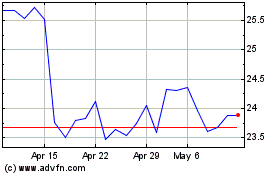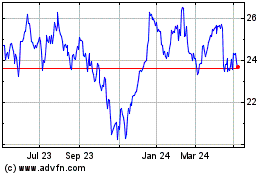Downbeat Coal Exports, Global Steel Markets to Weigh on Coal Stocks
June 18 2019 - 1:50PM
Dow Jones News
By Dave Sebastian
Investors are growing bearish on coal stocks amid concerns about
the export market and falling prices in a slowing global economy,
investment bank Seaport Global Securities LLC said in a report
Tuesday.
U.S. steam coal exports are slated to decline 12% this year and
an additional 25% in 2020, Seaport said. The decline could create a
domestic supply glut next year, potentially hurting the utility
market, if steel demand slows and prices don't rebound.
Shares of coal producers Contura Energy Inc. (CTRA), Ramaco
Resources Inc. (METC), Teck Resources Ltd. (TECK), Peabody Energy
Corp. (BTU) and CONSOL Energy Inc. (CEIX) have slumped over the
past 12 months.
Meanwhile, shares in Arch Coal Inc. (ARCH) and Warrior Met Coal
Inc. (HCC) have gained 14% and 5%, respectively, over the past 12
months.
Average per-ton spot prices for coal from the Northern
Appalachian region have fallen to about $53 after peaking above $70
in March, according to the Energy Information Administration,
citing data from SNL Energy. Meanwhile, Central Appalachian region
prices have fallen to about $59 a ton from nearly $84 a ton in
early January.
U.S. coal producers have been hungry to supply overseas markets
such as China and Europe in recent years as domestic coal
consumption has declined. Lower natural gas prices have also hurt
coal's competitiveness in the domestic market.
Prices of natural gas--which has grown its share of the U.S.
energy production in recent years--have slid below $2.50 per
million British thermal units since the end of May. Natural gas
futures hit $4.80 per million British thermal units in
mid-November.
The U.S. steel industry--a key end market for domestic coal
production--has also been one of the world's weakest steel markets
of late, according to Seaport. Prices for hot-rolled steel have
fallen to between $520 and $580 a ton, the report said, citing data
from CRU Group's Steel Market Update. About a year earlier, U.S.
hot rolled steel fetched about $900 a ton.
China, which produces half of the world's steel, has seen
blast-furnace profitability weakening in recent months as steel
prices have fallen and prices of raw materials such as iron ore
have increased, according to the report. Steel prices are also
unlikely to rebound as trade tensions remain high between the U.S.
and China, the report said.
"It becomes imperative for steel prices to rise greater than
their key raw material ingredients," the report said. "That simply
hasn't happened."
But there is a string of hope in China for U.S. coal exporters:
Chinese metallurgical coal customers are still poised to import
coking coal, as it is cheaper to import products than to source
coal domestically, the report said.
ArcelorMittal (MT), the world's largest steel producer, recently
cut production twice in the European Union, the report said,
indicating "all is not well on the continent."
"The company continues to cite weak demand and rising imports as
key reasons why it was forced to curtail production," the report
said. "Steel prices on the continent indicate this weakness."
Write to Dave Sebastian at dave.sebastian@wsj.com
(END) Dow Jones Newswires
June 18, 2019 13:35 ET (17:35 GMT)
Copyright (c) 2019 Dow Jones & Company, Inc.
ArcelorMittal (EU:MT)
Historical Stock Chart
From Mar 2024 to Apr 2024

ArcelorMittal (EU:MT)
Historical Stock Chart
From Apr 2023 to Apr 2024
